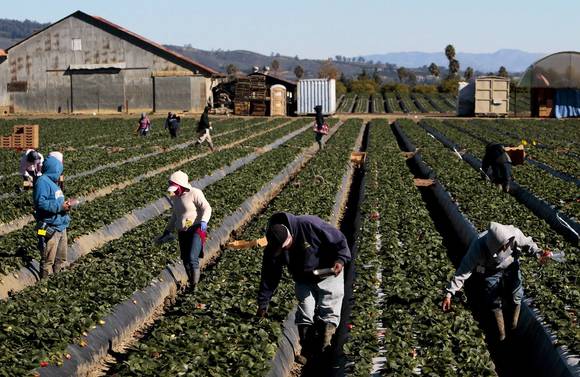At Chandler Farms, just outside of Selma in the San Joaquin Valley, about three dozen workers are needed each season to pick acres of delicate peaches, plums, nectarines and citrus.
In recent years, however, owners Carol and Bill Chandler have struggled to find laborers as immigration from
Mexicohas slowed to a near standstill.
"When the crops are ripe, we need a reliable labor force," she said. "That's what we're worried about going forward."
The Chandlers are among the state's farmers who welcomed a move this week by
Congress to make immigration reform a legislative priority this year.
But the promised changes may not be enough to solve their chronic labor problems, which have been exacerbated by deportations, a stronger Mexican economy and, in good times, the lure of construction jobs.
On Monday, a group of Republican and Democratic senators unveiled a blueprint that aims to grant legal status to an estimated 11 million illegal immigrants in the country.
President Obama also joined the fray Tuesday, urging Congress to move legislation along quickly this year.
Immigration reform has been a rallying cry among farm groups in California and around the country for years.
According to data from the
U.S. Department of Agriculture, roughly half of all hired crop farmworkers are in the country illegally. Of all workers, 7 of 10 are from Mexico, a country that has provided a steady supply of farm laborers to California since the middle of the last century.
With immigration reform back on the table this year, California farm groups are fiercely lobbying to make sure proposed legislation includes provisions for their workers.
There have been false starts in the past, including efforts by former President
George W. Bush, who sought to create a guest worker program and overhaul immigration laws during his administration.
But the latest push to tackle the highly politicized issue is "one of the best signs we've seen in a long time," said Ken Barbic, senior director of government affairs for Western Growers in Irvine, a trade group that represents farmers in California and Arizona.
If Congress passes legislation, "the folks who are currently working here with false documents, it takes them out of the shadows," Barbic said.
Barbic added that immigration reform would remove legal liabilities for employers who hire illegal immigrants.
Diego Olagaray, 51, who grows 750 acres of wine grapes in Lodi, just north of Stockton, said that granting legal status to the state's agricultural workers ensures that both farm hands and employers would be able to breathe a little easier.
"Some of these workers go back to Mexico on a regular basis," Olagaray said. When they travel, "they're fearful of something happening to them. With amnesty, it'll make them feel more comfortable. They'll also feel that they're part of society.… And it will make it easier for employers as well."
Olagaray said that if immigration isn't resolved soon, labor shortages will become more pronounced. Last spring, he said he had trouble filling his usual crew to work on his vineyard, and other growers saw ripe crops languish in the fields.
Still, any policy effort may do little to solve the labor shortage for California farmers, said Edward Taylor, a professor of agriculture and resource economics at UC Davis.
Such shortages predate the recession. During boom times, contractors persuaded many workers in the fields to work in construction jobs, according to farmers and Taylor, who recently co-wrote a study that examined the decline in the number of farmworkers from Mexico.
A key finding in Taylor's study was that more immigrants were staying home to work on Mexico's farms. They were taking advantage of a strengthening Mexican economy and a growing middle class that ramped up agricultural production.
Now, American farmers find themselves competing for a dwindling supply of workers.
"Immigration policy stops being a solution if you can't find workers," Taylor said.
Farmers in California have already begun adapting to the drying supply of laborers.
Growers, for instance, have swapped out labor-intensive crops such as tomatoes and peaches for less labor intensive ones such as tree nuts.
Almonds, which were the second-most valuable crop in California in 2011, were ranked No. 11 in 2000. Sales of almonds have skyrocketed from $682,000 to $3.9 billion during that time period, according to the California Department of Food and Agriculture.
Technology is also playing a role. Using robots that shake loose crops from trees, farmers have been able to cut back on labor costs.
Paul Wenger, president of the California Farm Bureau Federation, said farmers are well-aware that their industry is changing.
And although he agrees that a dwindling labor supply will cause problems further down the line, he said Congress should still pass immigration reform that will allow farmers to hire legal farmworkers.
"Within the next two decades, we're going to have a problem. A domestic workforce will not want to work in the fields," he said. "It's going to be a problem. But that still doesn't mean we shouldn't fix the problems that exist today."




